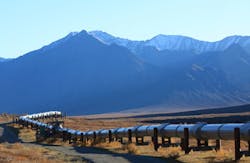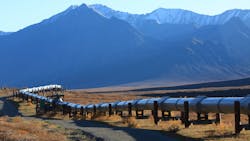Enbridge, Inc., Canada's largest crude oil transporter, is set to complete a project that would see a network of pipes spanning 5,000 miles. The project includes both laying new pipes and expanding existing infrastructure, Inside Climate News reported.
The reason why Enbridge's plans have largely escaped public attention is because the project consists of numerous small phases that have a relatively small impact when taken in isolation. In fact, the company is currently working on expanding pipeline capacity to increase the amount of crude carried to refineries and ports in the Midwest, the U.S. Gulf Coast and Northeastern Canada.
The whole project centers around the capacity expansion of Line 67, also known as the Alberta Clipper pipeline. It runs about 1,000 miles from Hardisty, Alberta to Superior, Wis. and currently carries up to 450,000 barrels of oil per day. Enbridge is looking to ensure that a further 430,000 barrels of oil per day could be shipped into the United States, bringing the maximum capacity to 880,000 barrels per day, compared to the 830,000 barrels proposed for the Keystone pipeline.
RELATED: Enbridge applies for capacity extension of Alberta Clipper pipeline
Since Line 67 is situated on both sides of the U.S.-Canadian border, its construction and expansion needs approval from U.S. authorities. The reviewing process has just begun at the State Department but is still in its initial stage — reviewing public comments regarding its environmental research scope. If the project is approved, Enbridge anticipates having the pipeline in action by the summer of next year. The Alberta Clipper pipeline is mainly intended to carry Canadian tar sands and conventional oil into the U.S. for refining and then for export.
As part of the broader expansion, Enbridge is also looking to expand Line 6B, running from Griffith, Ind. to Sarnia, Ontario, by a total of 293 miles. Construction started last year and the first stage of the expansion is set to be completed next year. At present 6B has the capacity to transport 240,000 barrels per day, but this will double on completion of the project in 2014. With a planned further expansion, predicted to be finished by 2016, the capacity will reach 570,000 barrels per day to be supplied to refineries in Michigan.
Another expansion project is underway but this time in Canada only. The capacity of Line 9, running 524 miles from Sarnia to Montreal, will be expanded by utilizing chemicals to reduce friction and accelerate flow. This project is currently waiting for approval from the Canadian National Energy Board and Enbridge plans to have it completed by the spring of next year. Line 9 will deliver crude to Quebec refineries.

